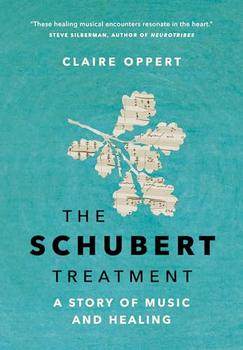Summary | Excerpt | Reviews | Beyond the Book | Read-Alikes | Genres & Themes | Author Bio

A Story of Music and Healing
by Claire OppertThis article relates to The Schubert Treatment
In The Schubert Treatment, musician Claire Oppert shares her experiences with the healing power of music. A classically trained cellist, Oppert was inspired by the work of her physician family members to begin playing music in nursing homes and medical facilities. One of these facilities was the Adam Shelton Center in Saint-Denis, France, which is a medical and educational institute for young people with autism spectrum disorder (ASD). Oppert's experiences there show the significant impact of music therapy for individuals with ASD, and this is supported by scientific research.
Music therapy is the use of music as an intervention to help accomplish specific, individualized goals. This form of therapy is clinical and evidence-based and is led by a professional music therapist. Music therapists have earned, at minimum, a bachelor's degree, and have completed 1,200 hours of clinical training including a supervised internship. They are thus able to create personal, music-based treatment goals based on their assessment of an individual's behavioral, emotional, cognitive, sensory, and motor skills. Subsequent therapy utilizes techniques such as singing/vocalization, instrument play, movement/dance, musical improvisation, songwriting/composition, or listening to music; the specific techniques used in a session will vary based on the person being treated and the proposed goals. Examples of goals include effectively expressing specific emotions, developing certain social skills, or learning new skills, such as songwriting.
Research has shown that individuals with ASD typically have positive responses to music, and that they often display a greater response to and interest in music than people not on the spectrum. As such, music therapy has become a common intervention to help individuals with ASD reach their goals and live their best lives, and since the mid-twentieth century, many studies have found specific positive outcomes. Several studies have shown that music can help people with ASD maintain attention. Non-speaking people have used music to communicate and express their emotions, and music generally provides multi-sensory stimulation that can encourage cognitive function. The rhythmic nature of music can also help regulate the sensory system, leading to enhanced auditory processing and motor skills.
Music therapy has been found to help increase engagement in the home and community for children with ASD. One study reported increased interpersonal skills, while another reported increased social skills. And researchers from the University of Kansas developed "social stories"—unique stories that addressed a current behavioral goal, set to original music—and found that both reading and singing the story were effective in reducing a targeted behavior compared to no story, but singing was more effective overall.
Music therapy is not typically covered by insurance, but because it is an evidence-based health profession, it is recognized under the Individuals with Disabilities Education Act (IDEA). School-aged young people can thus receive music therapy services at school as part of a special education curriculum. Therapy services may also be funded by grants from the state, foundations, or communities, and some states allow these services to be paid for using Medicaid.
Although the experiences Oppert shares in her memoir are anecdotal, scientific literature supports the use of music as a therapeutic tool in the realm of ASD. In 2015, the National Autism Center identified music therapy as an emerging intervention for adults with ASD, and in 2020, the National Clearinghouse on Autism Evidence and Practice included music therapy as an evidence-based practice for children aged 0-14, thus putting the use of music therapy into the established intervention regimen. The Schubert Treatment shares personal stories of music therapy and supports the scientifically acknowledged use of alternative interventions in helping those with ASD.
Filed under Music and the Arts
![]() This article relates to The Schubert Treatment.
It first ran in the October 16, 2024
issue of BookBrowse Recommends.
This article relates to The Schubert Treatment.
It first ran in the October 16, 2024
issue of BookBrowse Recommends.
Your guide toexceptional books
BookBrowse seeks out and recommends the best in contemporary fiction and nonfiction—books that not only engage and entertain but also deepen our understanding of ourselves and the world around us.